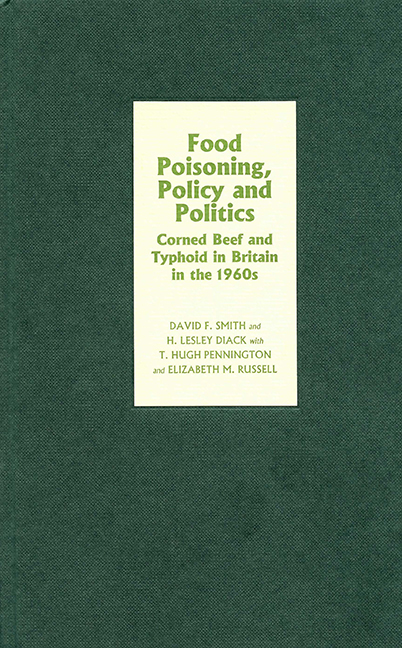Book contents
- Frontmatter
- Contents
- List of illustrations
- Preface and acknowledgements
- Abbreviations used in text
- Abbreviations used in footnotes
- 1 The earlier history of typhoid and food poisoning
- 2 The 1963 corned beef-associated typhoid outbreaks in Harlow, South Shields and Bedford
- 3 The Aberdeen typhoid outbreak
- 4 The medical officer of health, the media and the public in the Aberdeen typhoid outbreak
- 5 Ministers, officials and the Aberdeen typhoid outbreak
- 6 The Milne Committee of Enquiry
- 7 The recommendation on the inspection of overseas meat plants: the roles of existing policy agendas, and interdepartmental and inter-professional tensions
- 8 The disposal of suspect canned meat: the priority of politics over technical advice
- 9 British action to encourage improvements in Argentine meat hygiene, 1964 to 1969
- 10 Summary and conclusions, and food safety since 1964
- Appendix: Recommendations of the Milne Committee
- Bibliography
- Index
4 - The medical officer of health, the media and the public in the Aberdeen typhoid outbreak
Published online by Cambridge University Press: 24 October 2017
- Frontmatter
- Contents
- List of illustrations
- Preface and acknowledgements
- Abbreviations used in text
- Abbreviations used in footnotes
- 1 The earlier history of typhoid and food poisoning
- 2 The 1963 corned beef-associated typhoid outbreaks in Harlow, South Shields and Bedford
- 3 The Aberdeen typhoid outbreak
- 4 The medical officer of health, the media and the public in the Aberdeen typhoid outbreak
- 5 Ministers, officials and the Aberdeen typhoid outbreak
- 6 The Milne Committee of Enquiry
- 7 The recommendation on the inspection of overseas meat plants: the roles of existing policy agendas, and interdepartmental and inter-professional tensions
- 8 The disposal of suspect canned meat: the priority of politics over technical advice
- 9 British action to encourage improvements in Argentine meat hygiene, 1964 to 1969
- 10 Summary and conclusions, and food safety since 1964
- Appendix: Recommendations of the Milne Committee
- Bibliography
- Index
Summary
Introduction
This chapter expands the account of the local dimensions of the Aberdeen typhoid outbreak, and focuses upon the media role of the MOH, Ian MacQueen. It provides further insights into the actions of the health and welfare department, especially in terms of advising the public, and gives some indications of the experiences of Aberdeen's population. We will explore MacQueen's involvement with the media largely by examining the coverage that arose from his press conferences, held once or twice daily from 22 May to 19 June, but will also refer to some oral history and archival evidence. We will concentrate upon reports in Aberdeen's P&J and EE, which served as a means of interaction between MacQueen and the local population. Coverage in the Sunday papers will be included, since it provoked comment from MacQueen and civic leaders on several occasions. In the Milne report, as we will see in Chapter 6, MacQueen was condemned for his alleged extravagant use of the media, which was blamed for the sensationalisation of the outbreak. At the end of this chapter we will see, however, that during the outbreak SHHD officials remained sympathetic towards MacQueen regarding the pressure he was under from the media, and largely supportive of his strategy throughout the outbreak.
The press coverage arising from MacQueen's press conferences may be considered in three overlapping phases. During the first, prior to about 29 May, the conferences were the main source of information about the outbreak. MacQueen's statements and predictions dominated the headlines, and he came under pressure from journalists, and Aberdonians via letters to the newspapers, to release more information about the source of the outbreak, and further advice about the symptoms and prevention of typhoid. Faced with an unplanned and unknown situation, his handling of the press and the public appears to be largely reactive during this phase. As he responded to criticism he began to receive more positive and supportive coverage.
- Type
- Chapter
- Information
- Food Poisoning, Policy and PoliticsCorned Beef and Typhoid in Britain in the 1960s, pp. 96 - 126Publisher: Boydell & BrewerPrint publication year: 2005



